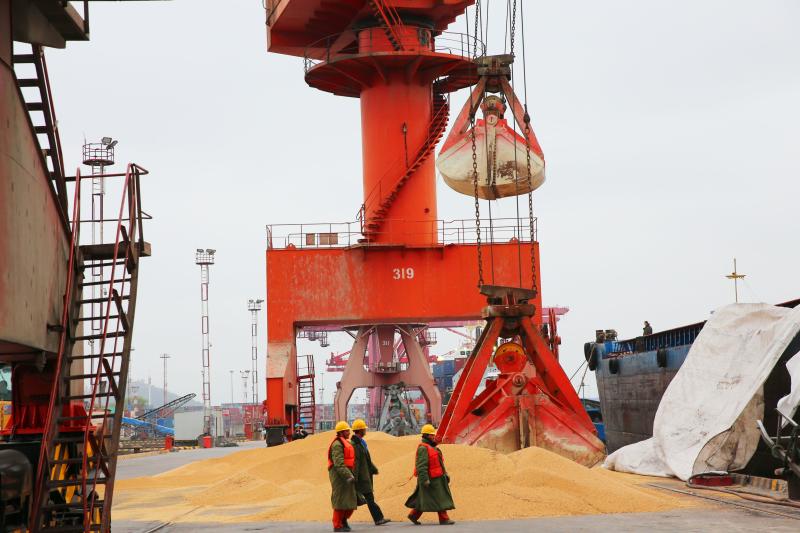China halts US agriculture purchases as trade war heats up
Sign up now: Get insights on Asia's fast-moving developments

In this file photo taken in 2018, a man walks past imported soybeans at a port in Nantong, China. China had already drastically cut on US purchases, with soybean imports sinking to the lowest in a decade during the first half.
PHOTO: AFP
BEIJING (BLOOMBERG) - China is stepping away from further US farm imports after United States President Donald Trump ratcheted up tensions with its biggest agricultural trading partner last week.
The Chinese government has asked its state-owned enterprises to suspend purchases of US agricultural products, people familiar with the situation said. Also, privately run Chinese crushers that had received retaliatory-tariff waivers on American soybeans from Beijing have stopped buying the commodity due to uncertainty over trade relations, other people said.
Chinese buyers have turned to South America for more of their supplies after Mr Trump last Thursday proposed adding 10 per cent tariffs on another US$300 billion (S$414 billion) in imports from Sept 1, marking an abrupt escalation of the trade war between the world's largest economies shortly after the two sides restarted talks.
Bureaucrats in Beijing were stunned by Mr Trump's announcement, according to Chinese officials who have been involved in the trade talks, and Beijing has pledged to respond if the US insists on adding the extra tariffs.
China's state-run agricultural firms have now stopped buying American farm goods, and are waiting to see how talks progress, the people said, declining to be identified as they're not authorised to speak to the media. Meanwhile, the private crushers haven't received notices from the government on any policy change since the US escalated tensions last Thursday, people said.
"The leverage that China has is its large agricultural purchases," Darin Friedrichs, a senior analyst at INTL FCStone's Asia commodities division, said in an interview on Bloomberg TV.
"This does affect US farmers and the rural US voting base that's normally in support of Donald Trump. If they hit back before the election, that's the obvious way to retaliate."
China's commerce ministry didn't respond to faxes seeking comment about the halt in purchases.
Chinese buyers are seeking to buy Brazilian soybeans again after trade talks soured, people familiar with the matter said on Monday (Aug 5). They were seeking cargoes mostly for September after their inquiries last Friday sent the premium for soy at Brazilian ports surging.
Mr Trump has repeatedly complained that China hasn't made the "large quantities" of agricultural purchases that he claims President Xi Jinping promised when they met in Osaka at the G-20 summit.
Those accusations are "untrue" as Chinese companies have bought US farm products, including soybeans, Cong Liang, Secretary General of the National Development and Reform Commission, said in an interview with state media CCTV. Some deals haven't been completed because the prices are not competitive, he said.
'Very Nervous'
Soybeans for November delivery slumped as much as 1.6 per cent on Monday before recovering to be up 0.2 per cent at 11.05am in Chicago. Corn tracked a similar path.
Hog futures, which plunged last week, were up 5.4 per cent. Earlier, soybean-meal prices in China and rapeseed meal futures advanced on expectations for tighter supplies.
China had already drastically cut on US purchases, with soybean imports sinking to the lowest in a decade during the first half. In a show of goodwill, the Asian nation had recently given the go-ahead for five private companies to buy as much as 3 million tonnes of US soybeans without paying retaliatory tariffs.
Meanwhile, state-owned firms earlier pledged to buy about 14 million tonnes in the current marketing year, of which 4 million tonnes have not yet been shipped.
The companies that had received the waivers were state-owned Jiusan Group, as well as privately run Shandong Bohi Industry Co and China Sea (Zhonghai) Grain and Oil Industry Co, Bloomberg reported last month. Yihai Kerry Group, a Chinese subsidiary of Singapore-based Wilmar International, and Hopefull Grain & Oil Group are also among the firms.
"I would be very nervous if I was a Chinese company trying to buy produce right now," Friedrichs said.
"We'll see a lot of private importers backing away from US products as well."


